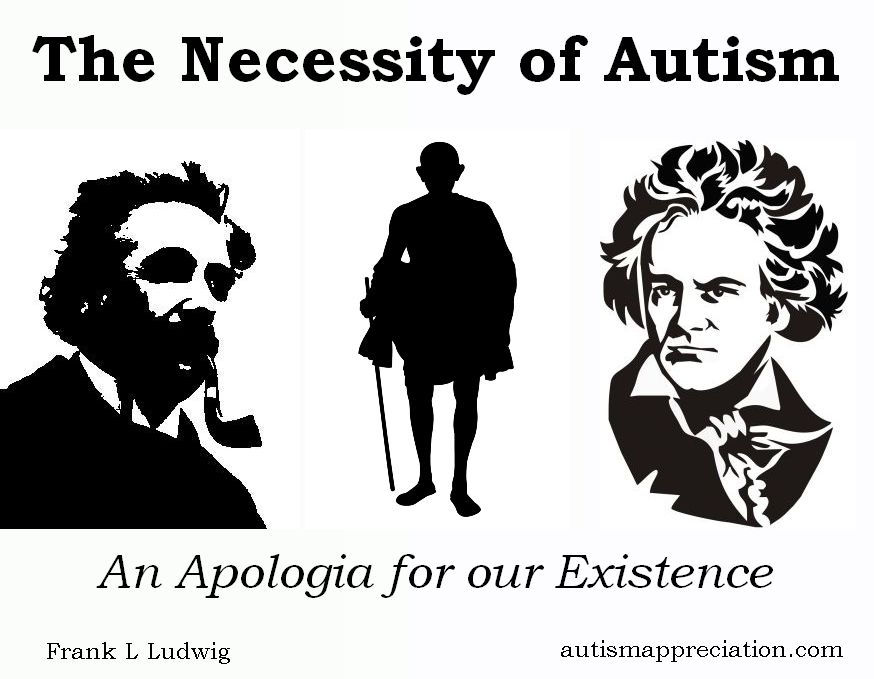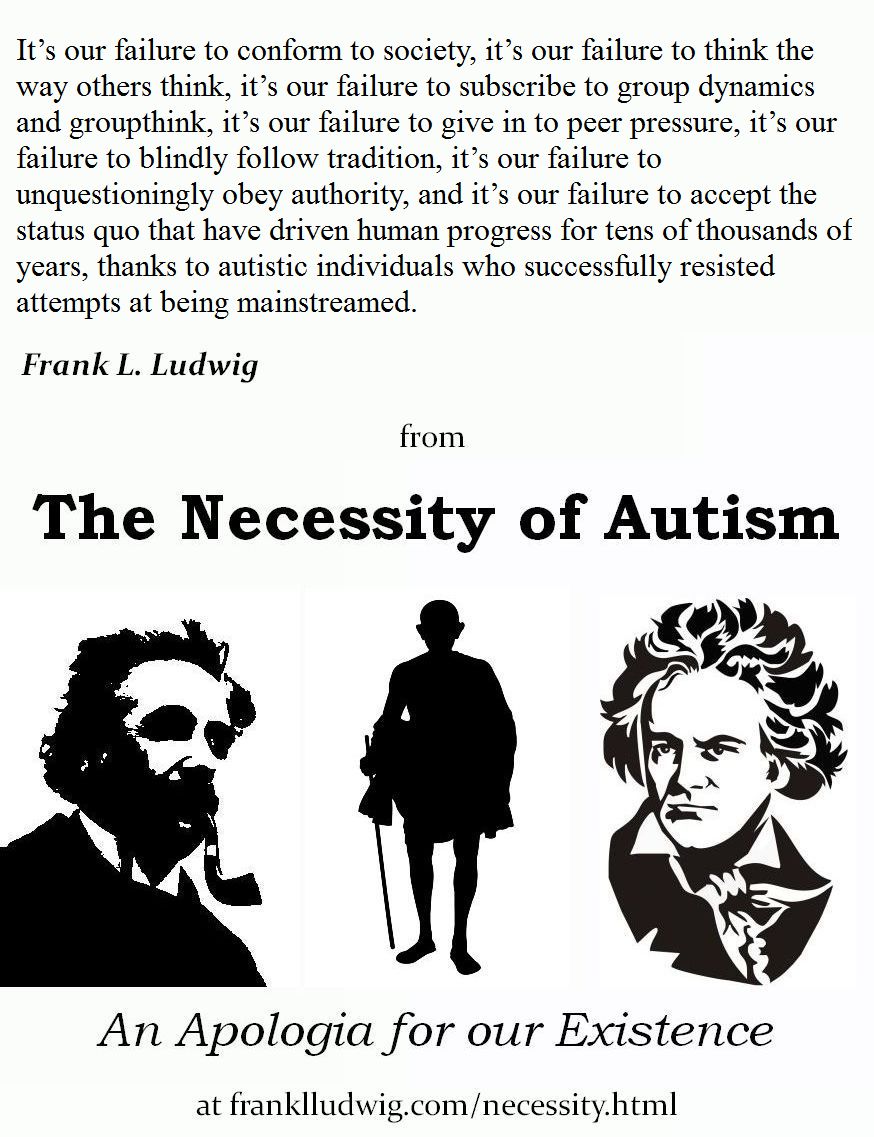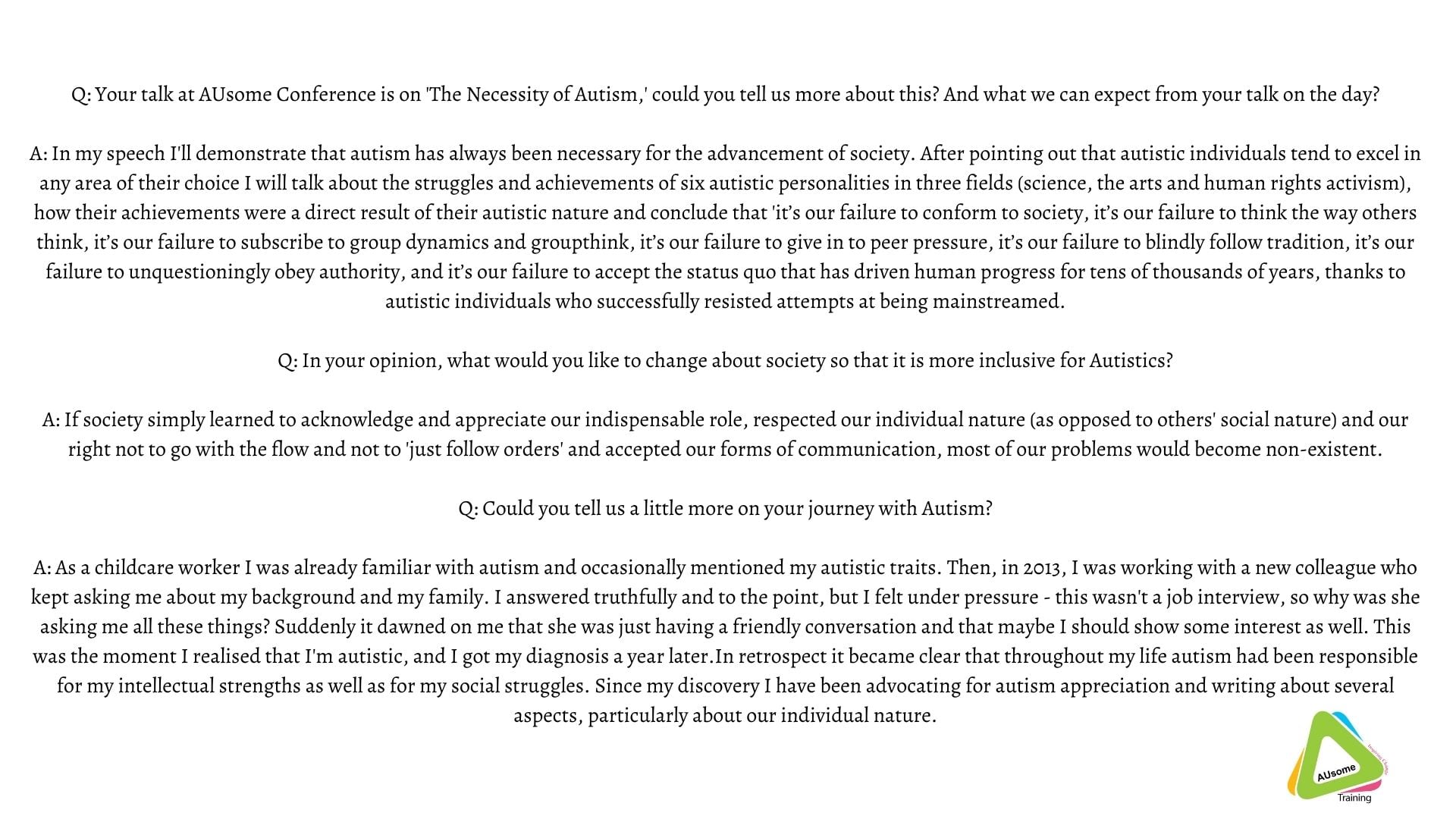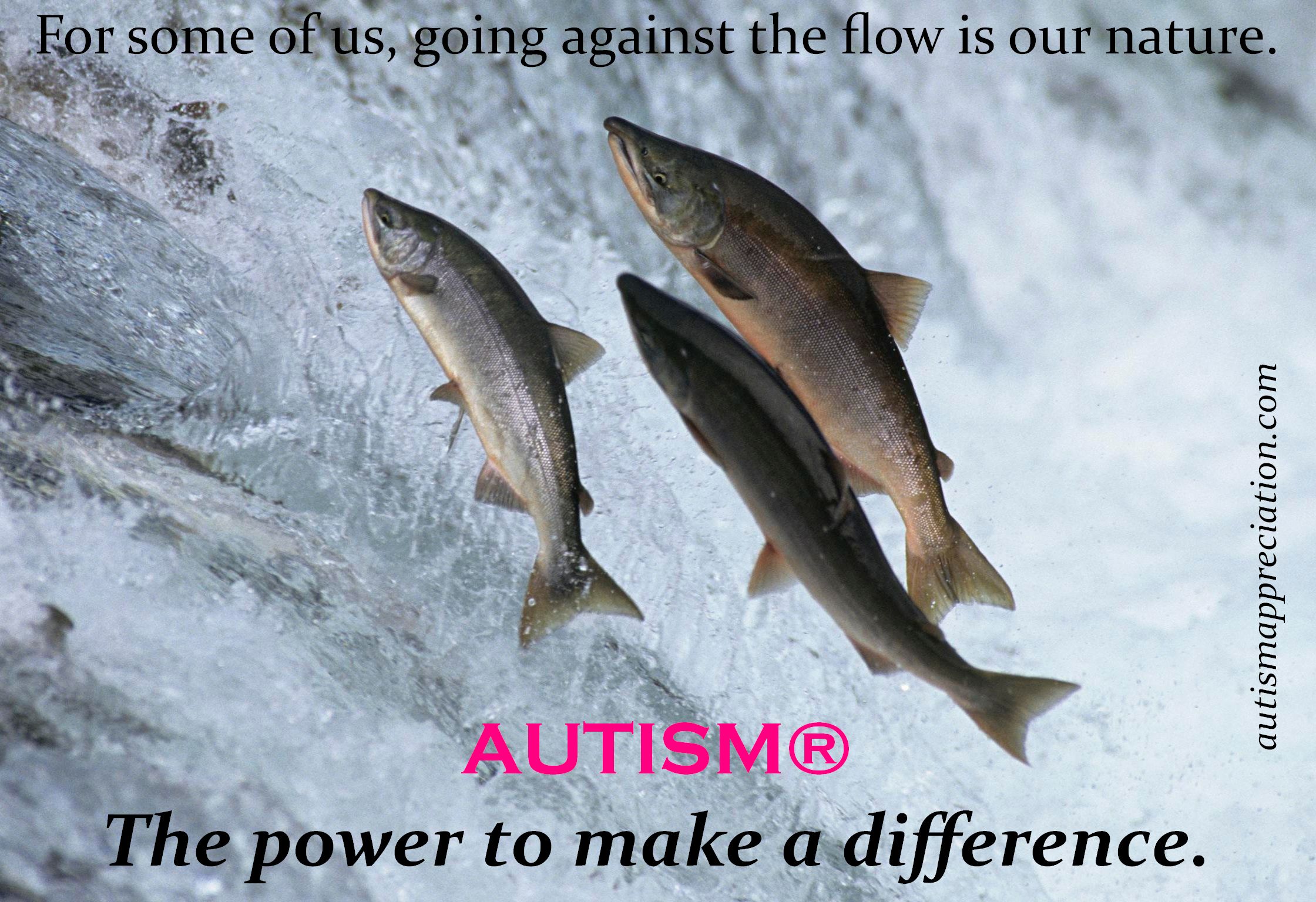
Read more on
|
Tweet
|
This is a list of autistic traits which is by no means comprehensive:
• Logical, analytical, independent and original thinking (‘outside the box’)
• Strong sense of fairness and justice
• Empathy beyond affiliation
• Resistance to group dynamics and peer pressure
• Scepticism of authority figures
• Intense focus on matters of interest
• Early reading and/or numeracy skills
• Attention to detail
• Pattern recognition
• Creativity
• Rationality
• Objectivity
• Incorruptibility
• Perseverance
• Honesty
• Reliability
• Tolerance
• Directness
• Perfectionism
• Common sense
• Difficulty in fulfilling mainstream people's social expectations
• High sensitivity to certain stimuli
But because we live in a society that is obsessed with conformity and social interaction, our adversaries only acknowledge (and in many cases are only aware of) the last two (difficulties meeting social expectations and high sensitivity) while the clinical definition is limited to our perceived social shortcomings. All these traits are a result of our predominantly individual nature, as opposed to the predominantly social nature of mainstream people. It should be noted that not all of these traits are present in all autistic people, and that none of these traits is exclusive to autistic individuals.
Since I was a child I have always been dumbfounded at how easily people are manipulated: they see a commercial and buy the product, they see a poster and vote for the candidate, they see friends wearing a particular brand of clothes and have to get it as well, they are told to do something, and they do it without questioning.
It was only in 2013, when I realised that I am autistic, that I understood the gullibility of most people: they want to fit in, they want to be part of the group, they want to be accepted. But those who manage to fit in are not able to stand out.
Throughout history autistic minds have significantly contributed to the progress of mankind thanks to their individual thinking. Autistic people tend to excel in any area of their choosing; for instance, as a childcare worker I usually was the first to notice when a child got upset while many colleagues only were alerted when the child burst into tears. This is because, due to their social nature, they were satisfied with a functioning group where everybody did what they were supposed to do whereas I, due to my individual nature, paid close attention to every single child. However, for this speech I have selected three particular areas in which you are most likely to find successful autistic persons: science, the arts and human rights activism, and for each field I will give two examples of people whose autistic thinking has made an impact.
The first four examples have been diagnosed by Prof Michael Fitzgerald, the scientists in his book Genius Genes and the artists in Genesis of Artistic Creativity.
As a child Isaac Newton didn’t appear to have had any friends, and there is speculation about whether he didn’t want friends or if he didn’t find any. Rather than playing with others, he would build windmills and sundials or fly kites to which he attached lanterns, which some people mistook for comets.
At the age of 15 his mother pulled him out of school and wanted him to become a farmer like his late father. He messed up, and it is generally believed he messed up on purpose in order to continue his education.
While mainstream children learn by copying adults, following instructions and repeating information, autistic people learn by experimenting, enquiring and logical thinking; repetition dulls our senses and neglects our need for permanent intellectual stimulation. This is the reason for our difficulties with mainstream schooling, and many of us become autodidacts who teach themselves in their areas of interest.
Although Newton did poorly in school, he was accepted to Trinity College in Cambridge where he was just as unremarkable. However, in his spare time he studied the subjects he was interested in, such as the work of astronomers like Copernicus, Galileo, and Kepler.
In 1665, when Newton was 22, Trinity was closed due to an outbreak of the bubonic plague. He subsequently spent the next one and a half years at his family’s place in Woolsthorpe during which he developed his theories of gravity, calculus and optics which would keep him occupied for many decades, revolutionise science and usher in the Age of Reason. His account of how a falling apple had inspired his theory of gravity is largely disbelieved, mainly because he supposedly only started telling the story when he was an old man, but amongst autistic people such eureka moments when suddenly everything makes sense and falls into place are quite common.
The only indication of any romantic involvement comes from a biographer who knew Newton personally and claimed that he had a short-lived relationship with a girl when both of them were in their teens. Apparently he chose to dedicate his life to his work at a very early stage.
Besides our tendency to be insomniacs because we find it difficult to put our overactive minds to rest, many autistic people forget about their basic needs, such as sleep or food, when they are working on something. In 1693, after having gone for five days without any sleep at all, Newton suffered a burnout but soon recovered and continued his work.
Isaac Newton established the scientific method, formulated the laws of motion and universal gravitation, laid the foundation of modern mechanics, developed the calculus, did groundbreaking research on optics, colour and waves and invented the reflecting telescope, amongst many other scientific achievements.
If Newton hadn’t been autistic, he probably would have listened to his mother, have become a farmer, and today we may still wonder why the Moon doesn’t crash into the Earth.
Like many, if not most, of us Albert Einstein was a perfectionist. As a child he saw no point in saying single words and therefore didn’t start speaking until he was able to articulate himself in full sentences which happened at the age of three or four. To be sure he got everything right, he used to mumble each sentence to himself after saying it, adding to his family’s concern that he might be intellectually challenged. He preferred to play on his own, mostly constructing things with building blocks or playing cards. On the rare occasions when he played with others, he sought and was assigned the umpire position due to his strong sense of fairness.
He did well in school and excelled in maths and physics but resented the authoritarian structure and the rote learning which, as a study has recently shown, is detrimental to autistic learning. At the age of 12 he taught himself algebra and Euclidean geometry, and at 15 he started writing scientific essays.
After he graduated Einstein, of course, wasn’t able to find a teaching post.
Despite tending to excel in our chosen professions, 85% of autistic people are unemployed due to our perceived social shortcomings, and most of the remaining 15% work in menial jobs rather than in the area of their strengths.
Einstein eventually found a post as an assistant examiner at the patent office in Bern where he was frequently passed over for promotion.
Working on scientific patents kept his mind busy, and when he had nothing to do, he looked out of the window at the clock tower, conducting thought experiments such as: What would happen to time if a car were to depart from the tower at the speed of light? Shortly after completing the special theory of relativity, he saw several men working on a roof and imagined what would happen if a person who is falling from a building dropped a ball, realising that this person would not observe the effect of gravity on the ball (besides possibly having other worries) and that therefore gravity was not a force, as was the scientific consensus at that time, but the curvature of space-time. Einstein has called it the happiest thought of his life since it led to his general theory of relativity. He always pointed out that imagination is more important than knowledge; after all, knowledge is already out there while imagination has the potential to create new knowledge.
His theory of relativity became one of the pillars of modern physics; the other being quantum mechanics to which he had also made a crucial contribution with his discovery of the law of the photoelectric effect.
Einstein was also a lover of music and played the violin at a professional level. He had been given lessons at the age of 5 which he did not enjoy; at the age of 13 he discovered Mozart and taught himself to play without, as he put it, ‘ever practising systematically’.
He was an outspoken pacifist, humanist and socialist who frequently used his celebrity status to denounce the ruthless greed of the few and the herd mentality of the many. He campaigned for many causes, such as equal rights for black and gay people.
Ludwig van Beethoven was one of the rare cases in which the career his father had decided to push him into coincided with his talent. However, rather than practising the pieces he was given, the boy preferred to improvise or make up his own tunes at the piano for which was severely punished by his abusive father. Fortunately this didn’t dishearten him, and his other music teachers seem to have been more encouraging. He first performed publicly at the age of seven, and his first compositions were published when he was twelve. He hardly played with other children, and his formal education was minimal and ended at age eleven to focus on his musical tuition, and while he never managed arithmetic beyond simple addition, he taught himself in areas of interest such as literature and ethics.
While most composers, once they had a piece worked out, wrote down the musical score without many alterations afterwards, Beethoven made several drafts of his compositions to which he kept applying changes until he was satisfied with the result, and he often worked on three or four projects simultaneously.
He gradually lost his hearing following a meltdown at the age of 28, which was caused by being interrupted at his work.
It is quite common for autistic people to question norms and rules. His early works had already established him as one of the greatest if not the greatest composer of the Classical period. But in his early thirties he decided that this was not good enough, saying, ‘I am not satisfied with the work I have done so far. From now on I intend to take a new way.’
And so he did, bringing the Classical period to an end and ringing in the Romantic era. He began breaking with traditions and rules and defying conventions and started experimenting. His audience was divided, and while some hailed him as the greatest musical genius of all times, others described his compositions as bizarre, overly complex, unnecessarily long and often as unplayable; to those critics he replied that this was ‘music for a later age’.
He did things that were unheard of, such as having a female lead in an opera or a chorus in a symphony, and introduced new or long-forgotten elements.
The first step on his new way was the Third Symphony which was initially entitled Bonaparte; as a believer in liberty, equality and democracy he had been an enthusiastic supporter of the French Revolution, but when Napoleon betrayed its ideals by assuming the dictatorship, Beethoven ripped the title page in two.
Besides changing the course of music and revolutionising the composers’ toolkit, Beethoven also established the genre of the song cycle.
Hans Christian Andersen was a prolific writer who is most famous for his fairytales. Throughout his life he was painfully aware of his otherness and outsider status, no matter where he went, and this is reflected in his works. There was no knowledge of autism in his days, but most of his fairytales deal with one or several aspects of autism.
The most obvious example is The Ugly Duckling which is about a supposed duckling who is so different from the others that he is ridiculed, bullied and abused by his mother and siblings and the other ducks for being ugly. He runs away and encounters other birds and creatures who treat him the same way until he is drawn to a bevy of swans and, tired of life, expects them to kill him. But as he bows his head, he sees his reflection in the water and realises that he is a swan also, and he is welcomed by the others.
Just like a swan is not a failed duckling, an autistic person is not a dysfunctional mainstream person.
The Emperor’s New Clothes is the story of two conmen who claim they can weave magnificent clothes that are invisible to people who are unfit for their office or stupid, creating a collective pretence since nobody wants to be considered incompetent or ignorant. But when the king holds a procession to show off his new garments, a child says, ‘But he hasn't got anything on.’ Now everybody knows that everybody else knows that the king is in the nude, but he and his train continue the procession to keep up appearances.
The child in this story represents the autistic person who isn’t affected by group dynamics and tells it like it is.
Interestingly, Andersen only thought of the child when the story was already at the printer. The idea might have been sparked by a memory from his own childhood when he, with great anticipation, attended a procession of the Danish king with his mother, just to disappointedly exclaim, ‘But he’s only human.’
The Princess and the Pea introduces a dishevelled princess who arrives unannounced at a castle whose prince is looking for a real princess to marry. In order to test her nobility, the queen puts a pea on her bed and covers it with twenty mattresses and twenty eiderdown beds; when the princess claims she was unable to sleep because she was lying on something hard, she passes the test.
It’s not clear whether the princess had arrived by chance or if she travelled alone and on foot to woo the prince, but either scenario would be unusual, to say the least. The first one would correspond to our common experience of feeling out of place, the second one to our tendency to do things differently. And the fact that she couldn’t sleep because of the pea clearly refers to the high sensitivity many of us experience, often about things others don’t even notice. We may react badly to certain sounds, textures, tastes, smells or lights because we sense them more intensely than others do.
The Shadow tells the story of a luckless learned man whose shadow separates from him and goes his own way. Years later he returns to the man in fully human form, boasts about how prosperous he has become and provides for the man under the condition that they swap places in public where the shadow introduces the declining learned man as his shadow. The shadow continues to prosper and eventually marries a princess while he has the learned man executed.
The Shadow is about masking. Masking means suppressing autistic behaviours and copying the behaviour of others in order to be taken seriously. Masking drains our energy and our emotions and has the potential to rob us of our identities, it is practically self-applied ABA. Those of us who were diagnosed as adults, as well as the children who were discouraged from behaving autistically, have spent our lives learning to mask in order to please others, often resulting in mental breakdowns, burnouts, PTSD and even suicide.
The protagonist remained unsuccessful while his masking alter ego was rewarded with fame and fortune. That’s why he eventually gave up his identity entirely to completely merge into the other persona.
A third persona is mentioned in passing, a second shadow that appeared after his original shadow left him. It plays no further part in the story and represents the passive persona which stays in the background and tries not to draw attention.
On the lighter side Blockhead Hans, also known as Jack the Dullard, is about two brothers who get horses from their father to visit a princess who has promised to marry the most articulate suitor. The less educated third brother, called Blockhead Hans, wants to go as well, and since he doesn’t get a horse, he rides to the castle on his goat, collecting a dead crow, a torn shoe and a handful of mud on the way.
At the castle the suitors are crammed into a small space, and it’s terribly hot due to, as the princess explains, her father roasting pullets. The two brothers fail to say anything of substance when Hans rides in and asks if he could roast his dead crow with the pullets. The princess is delighted and asks him where they should roast it in, and he pulls out the torn shoe. When she asks for sauce, he puts some of the mud over it, and when she points out that clerks are taking down each word he says, he throws the remaining mud at the head clerk. The princess finds him to be the most articulate suitor and marries him.
Autistic traits in this tale include the hoarding of things that may be of use at a later stage, being pragmatic rather than formal and being oblivious to or unconcerned about social norms. It’s also noteworthy that the author named the protagonist after himself.
If Hans Christian Andersen hadn’t been autistic, he wouldn’t have had anything to write about.
The importance of autism in the areas of science and the arts has already been pointed out by Hans Asperger in the 1940s. But when I became aware of being autistic in 2013, I realised that autism can be a forceful tool in almost every field. One in particular caught my attention: human rights activism. Due to our strong sense of fairness and justice, as well as our perseverance, I thought, many leading activists ought to be or have been autistic. At that time Internet searches didn’t return any results for autistic human rights activists, and so I decided to look into it myself.
The first name that sprang to mind was Mahatma Gandhi, and so I had a look at his life, found that his autobiography almost spells out that he was autistic and wrote an essay about it.
I accept that I don’t have the formal qualification to make a diagnosis, but fortunately the article was brought to Prof Fitzgerald’s attention who happens to concur with my conclusion.
When autistic people are religious, they often tweak their faith to fit their own worldview. Newton, for example, was a devout Puritan who denounced the concept of the Trinity, and Gandhi, a devout Hindu, denounced the caste system, which is as fundamental to Hinduism as the Trinity is to Christianity, and which he regarded as inhuman, especially the concept of untouchability.
Since he was a child he avoided company whenever possible and preferred reading books. After having studied in London, he was called to the bar and returned to India where he set up a law practice but soon had to give it up after finding out that his inability to speak in public extended to arguing a case in court.
Autistic people tend to be more tolerant and to have a strong sense of fairness and justice, regardless of their association with either side. As a member of the London Vegetarian Society, Gandhi befriended its president Arnold Hills, but when Hills raised (or supported) a motion to remove another member from the society for promoting birth control, Gandhi opposed him. Both Gandhi and Hills condemned birth control, but Gandhi argued that one’s position on it was irrelevant in a vegetarian organisation. He wrote his opinion down and had it read out by another member but could not prevent the expulsion of said member.
Gandhi remembered, ‘Thus in the very first battle of the kind I found myself siding with the losing party. But I had comfort in the thought that the cause was right.’
He accepted a distant cousin’s offer to assist him in a court case in South Africa at the age of 23. Here he both witnessed and experienced the brutal discrimination of Indians and black people, and his refusal to be put in his place, such as leaving a first-class train compartment he had paid for or avoiding the footpath which was reserved for whites, frequently led to his humiliation and physical abuse. He felt something had to be done, and the following year he founded the Natal Indian Congress and started campaigning against the discrimination of Indians. The urgency of his cause eventually enabled him to overcome his inability to speak in public. When the court case was concluded, he was given a big farewell party during which he noticed a newspaper paragraph about the planned disfranchisement of Indians in Natal and decided to stay to fight for his fellow Indians.
During his years in South Africa he developed the philosophy of non-violent resistance which he applied to his struggle for independence after his return to India at the age of 45, and to which he later added the element of non-cooperation. He continued his mission with autistic perseverance and originality despite major obstacles and setbacks and eventually succeeded.
Gandhi once wrote, ‘My independent spirit was a constant source of trial.’
However, his independent spirit also freed the subcontinent from British oppression and inspired civil rights movements all over the world which are still measured against his principles.
In 2011 an 8-year-old girl first heard about the climate threat but was told that nothing could be done about it. Now most mainstream children who are told by an adult that nothing can be done about something will just shrug their shoulders and get on with their childhoods, but not this girl. As a result of her worries she got depressed, stopped eating, became selectively mute and was eventually diagnosed with autism.
In 2018 she decided to do something and planned a protest. When mainstream people organise a protest, they usually mobilise others who have similar views; however, networking is not exactly our strong point (which is probably why we are one of the last unheard minorities), and so she skipped school, made a plaque and sat in front of the Swedish parliament. You know the rest of the story.
(Since I wrote this speech, another great human rights activist was diagnosed with autism: Julian Assange. I had long suspected him, and I was convinced when he, while enjoying asylum in the Ecuadorian embassy in London, reported a corruption scandal on WikiLeaks involving the Ecuadorian president. Only an autistic person would stick to their principles regardless of their personal safety.)
Again I want to stress that these three areas are merely examples and that autistic people tend to excel in any field of their choosing. If employers valued professional skills as much as they value social skills, most of us would be in employment and get things done. And if the autistic way of learning were accommodated rather than eliminated by the educational system, this world would produce many more Einsteins, Beethovens and Gandhis.
In conclusion, it’s our failure to conform to society, it’s our failure to think the way others think, it’s our failure to subscribe to group dynamics and groupthink, it’s our failure to give in to peer pressure, it’s our failure to blindly follow tradition, it’s our failure to unquestioningly obey authority, and it’s our failure to accept the status quo that have driven human progress for tens of thousands of years, thanks to autistic individuals who successfully resisted attempts at being mainstreamed. As an autistic professor once pointed out, if it weren’t for autism, we’d probably be chatting away in a cave today.
We shouldn’t be here begging for equal rights. We should be here demanding our rightful place in society.
The world needs autistic thinking. The world needs autistic thinkers. The world needs autism.
Some people argue that historical figures can't be claimed to have been autistic because the diagnosis didn't exist in their time. This argument is based on their view of autism as a disorder rather than a neurological orientation; by the same argument Oscar Wilde couldn't be said to have been homosexual because homosexuality was not diagnosed until 1952.
MORE ON AUTISM


AUsome Interview

